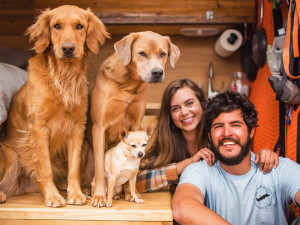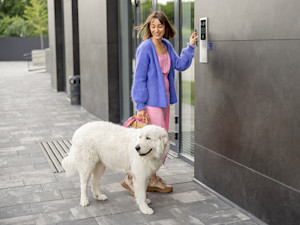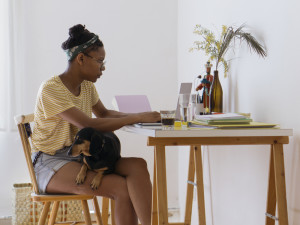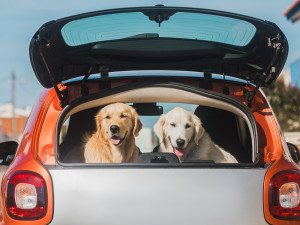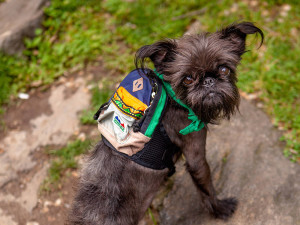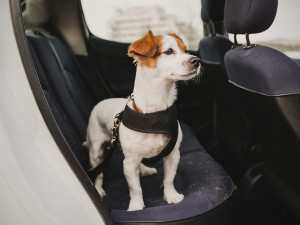Downsize It: How to Live in Small Spaces With Pets
Whether you’re stuck in a tiny apartment or living on the road, @KeepingFinn’s Henry Friedman offers tips to not only endure — but thrive.
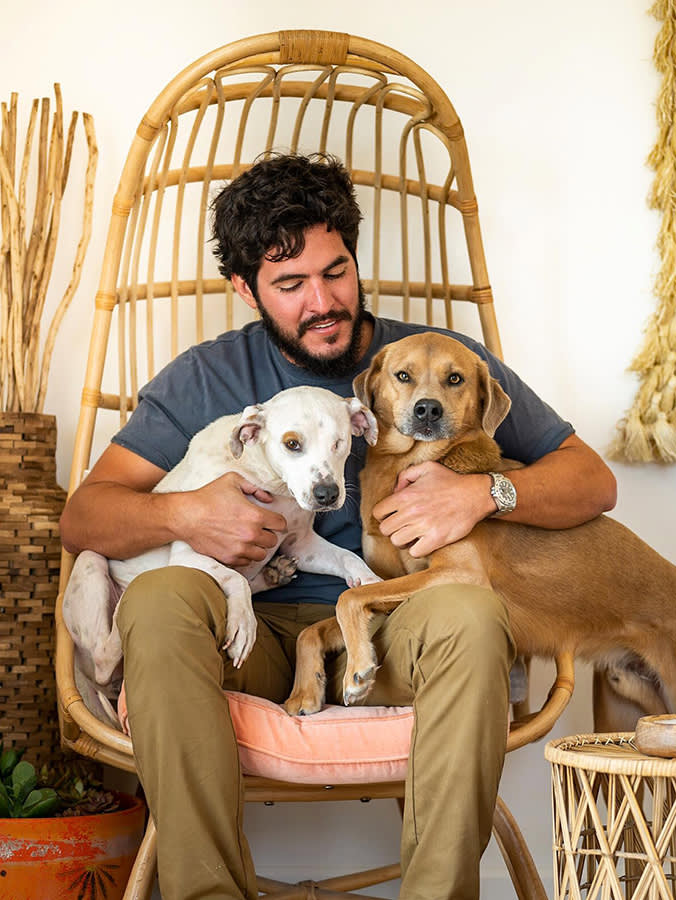
share article

Your pet wants you to read our newsletter. (Then give them a treat.)
As a longtime New Yorker, I have a lot of experience with snug living situations. In this city, minimal square footage is essentially a given. But thanks to fallout from the pandemic, inflationopens in a new tab, and, let’s be honest, good old-fashioned greed, tiny housingopens in a new tab is no longer just a New York staple. With less costing more, tiny houses have become a popular option across the country. Some people have even decided to leave the rental market altogether, opting to live an adventurous life on the road. Many in this #VanLife opens in a new tabcommunity are not only finding success and comfort in such small spaces — but doing so with pets.
Rescue advocate and expert and The Wildest Collective member Henry Friedmanopens in a new tab, of @KeepingFinnopens in a new tab, has spent years living in a van with his dogs and says there are more benefits to this lifestyle than you might think. “Similar to humans, sharing a small space with your dogs will inevitably create a stronger bond. Since we’re always around each other, we’re all closely dialed into each other’s needs,” he tells The Wildest.
He adds that it could actually be fun for the animals: “Everything is a trade-off. For us, we’ll take the challenges of living in a small space or van for the freedom of spending most of our time in the beautiful outdoors. And no one enjoys being in the outdoors more than our dogs.”
Hard to argue with that logic. If you’re looking to downsize or hit the road with some pups, Friedman gave The Wildest advice on how to make it a positive experience for both you and your pets.
Consider Breed Types
Maybe you already live in a small space and are looking to add a dog to the mix. First of all, great idea. Secondly though, it’s important to prioritize specific breed types. According to Friedman, “The best dog for a small space is a lap dog, like a Chihuahua. That’s just because they don’t need much exercise opens in a new taband are perfectly happy just hanging out.”
While larger dogs tend to have decent temperaments for small spaces because they’re less high-energy, there is a point where they might be physically too big for the space. More than anything, Friedman recommends getting a pet that matches your own vibe and way of living. “Personally, I think it’s still best to choose a dog for your own lifestyle. We have medium-sized athletic dogs that love to explore outside and hike with us. So, we just have to do a little more to make sure they’re happy and healthy,” he says.
Organization is Key
When living in a tiny room, everything has to be dual purpose. For example, I once rented an apartment in Queens with a bathtub in the kitchen — a chic setup for a single man in his early 20s. While not every setup has to be that extreme (or disgusting), Friedman notes that applying multiple uses for each area can go a long way in executing daily tasks. “In small spaces, everything has to be multipurpose — the same countertops you chopped your food on are going to be your office table an hour later,” he explains.
Keeping the place tidy is equally essential. Because of the miniature footage, any clutter will appear even larger and more significant. Luckily, the opposite is also true. “In small spaces, things can get cluttered and messy pretty quickly, but it’s also really easy and quick to clean up,” Friedman adds.
Prioritize Potty Training
Of course, it’s important that all pets are properly trained for many reasons, mostly having to do with their comfort and your home’s sanitation. However, the side effects are heightened when you downsize. Or, as Friedman puts it, “Potty trainingopens in a new tab is very important in a small space because you don’t want your space to be taken over by poop smells.” Luckily, this, too, is easier to correct in a tiny place; pets will have fewer rooms to try out as potential toilets.
Follow a Routine
Given the constraints of these dimensions, it’s unlikely your pup is getting enough — or any — exercise inside. To combat this, it’s crucial you add walks to your daily commitments. As Friedman tells it, “Since our dogs can’t exactly go all out and release their energy inside our van, it’s important that we build exercise into their daily routine in a way that works for our schedule. If you don’t, the dogs will be scratching at the doors the moment you sit down to start working.”
This is equally important for mealtimes. Like most pet parents, Friedman feeds his dogs, twice a day at the same time. But, again, thorough clean-up from any lingering food is necessary to avoid messiness.
Invest in Some Enrichment Toys
Some pets may have a tougher time fulfilling adequate mental stimulation. For this, enrichment toys are an easy solution. Snuffle mats, puzzlesopens in a new tab, and treat fillable toys are all solid options to help them occupy their minds during downtime.
Get Comfy With Pets on the Bed
Does pineapple belong on pizza? Are hotdogs a sandwich? Should we let our pets sleep in bed with us? These debates will probably continue long after my one-bedroom collapses on top of me, but for a tiny living situation there is no question — our beds are also our dog’s. Luckily, there are plenty of benefitsopens in a new tab to leaning into this ordeal. And other than simply being cute as hell, sleeping next to a pup can reduce depression, increase sense of security, and improve sleep quality.
Plus, if you live in a small apartment or van — you don’t have a choice. “In small spaces, most of your space is shared. Our dogs have to walk across our countertops to get on/off the bed safely. This is just how we do it,” Friedman explains. Besides, our dogs are nothing if not furry heating pads. “Sometimes it can get pretty cold in the van at night, so the dogs cuddle up with us in bed to keep themselves warm — it would be difficult to deny them our warmth on a cold night.”
Give Pets Their Own Space
That being said, it’s still important to give your dog their own space. According to Friedman, offering pets a designated area that they can call their own is vital to their comfort. “We built a dog bed for them on our passenger seat. It’s out of the way — very important in a small space — and it’s where they go to nap, hang out, and look out the window,” he says.
Have an Arsenal of Cleaning Supplies
Look, this is a safe space. We all love our pets but — they’re nasty. Friedman agrees, albeit with a slightly softer tone. “If they rolled around in something gross, which is inevitable, you can’t just let them stink bomb your entire home by letting them back in. So, you have to be prepared to handle that situation when it happens,” he says before adding that water, snowopens in a new tab, dirt, and mud are just a few of the exciting elements pups can bring into your home. Friedman recommends having a towel and brush handyopens in a new tab for quick wipe-downs before they fully reenter the domain.
Additionally, products such as dry shampoosopens in a new tab, deodorizing sprays, or sanitary wipes opens in a new tabwill help alleviate the impulse for daily baths. Speaking of which, Friedman advises against any form of grooming inside the space. “Do it outside or elsewhere! We don’t do much grooming but when we do, it’s outside our van with a hose, or we bring them to a local self-serve dog wash,” he says.

Sean Zucker
Sean Zucker is a writer whose work has been featured in Points In Case, The Daily Drunk, Posty, and WellWell. He has an adopted Pit Bull named Banshee whose work has been featured on the kitchen floor and whose behavioral issues rival his own.
Related articles
![]() opens in a new tab
opens in a new tabThe Top 20 Dog-Friendly Cities
Looking for a change of scenery? A recent study by Rover and Zillow can point you in the right direction.
![dog walking on the patchy grass outside while wearing a red, yellow, and blue version of Charlie's Backpack]() opens in a new tab
opens in a new tabThis Pack Is More Into the Wild Than Back to School
The backpack from Charlie’s Backyard is perfect for dogs who love to hike and hold their own valuables.
![Jack Russell dog in backseat of s car wearing a safety harness and seat belt]() opens in a new tab
opens in a new tabHow to Keep Your Dog Safe in the Car
Hitting the road with your dog? Make sure they're safe with this helpful advice.
